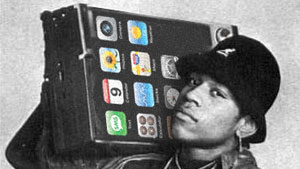 Music labels and radio broadcasters can’t agree on much, including whether radio should be forced to turn over hundreds of millions of dollars a year to pay for the music it plays. But the two sides can agree on this: Congress should mandate that FM radio receivers be built into cell phones, PDAs, and other portable electronics.
Music labels and radio broadcasters can’t agree on much, including whether radio should be forced to turn over hundreds of millions of dollars a year to pay for the music it plays. But the two sides can agree on this: Congress should mandate that FM radio receivers be built into cell phones, PDAs, and other portable electronics.
The Consumer Electronics Association, whose members build the devices that would be affected by such a directive, is incandescent with rage. “The backroom scheme of the [National Association of Broadcasters] and RIAA to have Congress mandate broadcast radios in portable devices, including mobile phones, is the height of absurdity,” thundered CEA president Gary Shapiro. Such a move is “not in our national interest.”
“Rather than adapt to the digital marketplace, NAB and RIAA act like buggy-whip industries that refuse to innovate and seek to impose penalties on those that do.”
But the music and radio industries say it’s a consumer-focused proposition, one that would provide “more music choices.”
A grand bargain
Autumn, “that season of mists and mellow fruitfulness,” approaches, and as Congress returns soon from recess, it will find its autumn agenda packed with supplicants who want the government to put its stamp on private negotiations. Google and Verizon famously released their own legislative framework on network neutrality earlier this month, and the broadcasters and music labels are nearing completion on a similar framework of their own.
In this case, the framework concerns public performance rights. Radio broadcasters and music labels are at each other’s throats over the question of whether radio ought to pay performance rights to labels or artists when it plays their music on the air (currently, only songwriters get paid, not artists or labels). A bill percolating in Congress, the Performance Rights Act, would rationalize performance rights in the US; satellite radio and webcasters currently pay full performance fees to labels or artists, but radio does not, thanks to a longstanding exemption in copyright law.
The bill has already passed out of committee in both the House and Senate, but it is vigorously opposed by the broadcasters; they argue that radio provides valuable promotion to artists and shouldn’t have to pay. Congress tried to force two of the main lobbying groups, the National Association of Broadcasters and musicFIRST (RIAA is a member), to hash out a solution last November. None was forthcoming, but talks have continued since then and are now close to completion.
The two sides hope to strike a grand bargain: radio would agree to pay around $100 million a year (less than it feared), but in return it would get access to a larger market through the mandated FM radio chips in portable devices.
“As regards the chip, this is a key issue for the radio industry,” musicFIRST told Ars today. “musicFIRST, too, likes FM chips in cell phones, PDAs, etc. It gives consumers access to more music choices.”
As the contours of this deal came into sight last week, the consumer electronics companies saw the prospect of a new government mandate, and one that was transparently about propping up a particular (and aging) business model.
“The performance royalty legislation voted out of the Senate Judiciary Committee does not include this onerous and backward-looking radio requirement,” said the CEA’s Shapiro, and he wants to keep it that way.
The deal has not been finalized, we’re told. When it is, the two sides still need to convince Congress to go along, but they’re hopeful something can be wrapped up late this year or early in 2011.
Update: NAB stresses to us that no deal has been finalized. “However, if there is a decision made by the Board of Directors to go forward and seek legislation, including radio-enabled chips in mobile devices in possible legislation seems to us to be a reasonable idea,” says NAB’s Dennis Wharton.
As for the CEA criticism, “It’s no surprise that CEA opposes this, since trade associations generally always oppose new rules. CEA also opposed DTV tuners in digital television sets; the FCC decided that having DTV tuners in TV sets was a good thing, and passed a rule that gave consumers access to local TV stations on DTV sets.
“We would argue that having radio capability on cell phones and other mobile devices would be a great thing, particularly from a public safety perspective. There are few if any technologies that match the reliability of broadcast radio in terms of getting lifeline information to the masses.”

